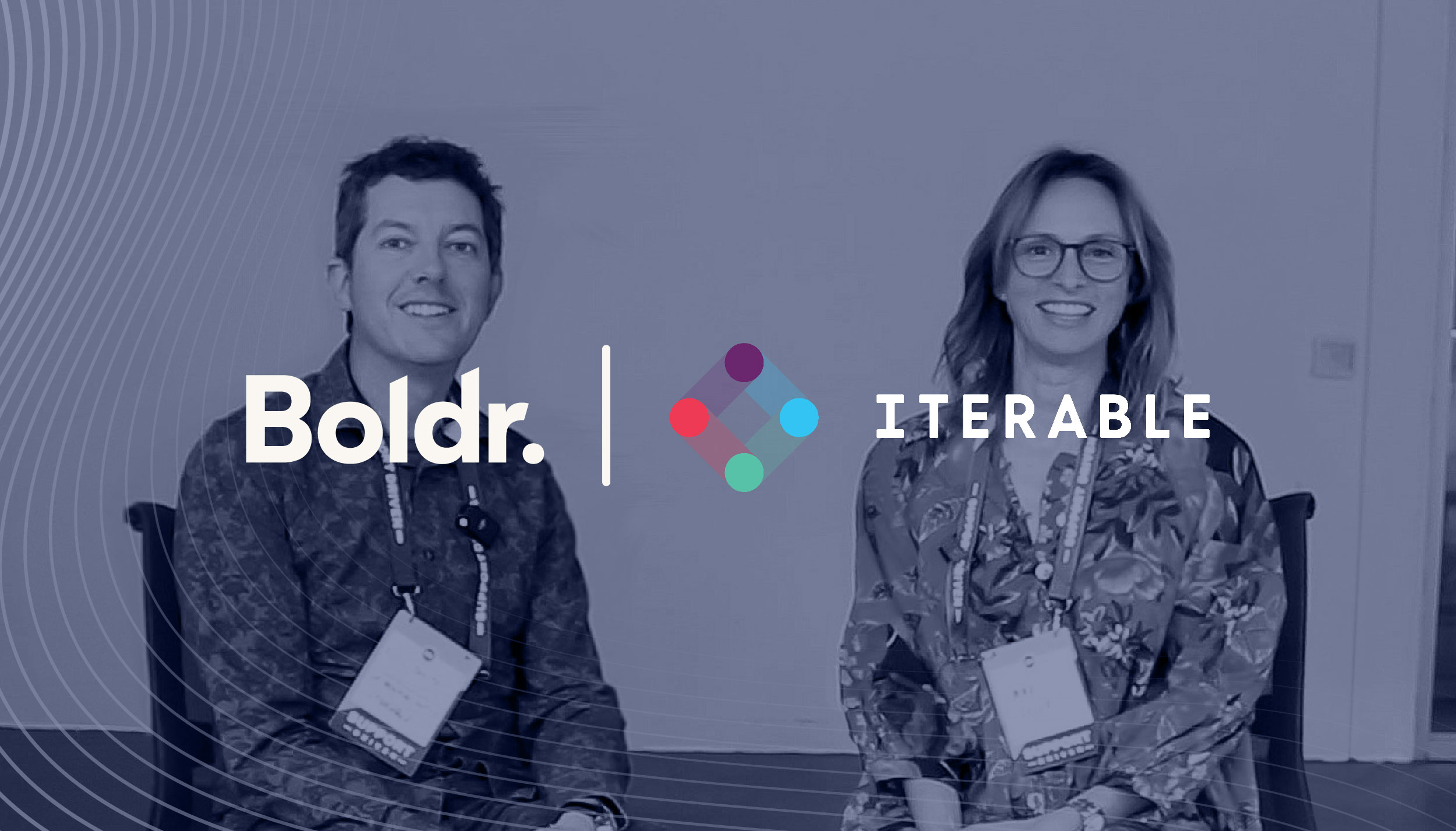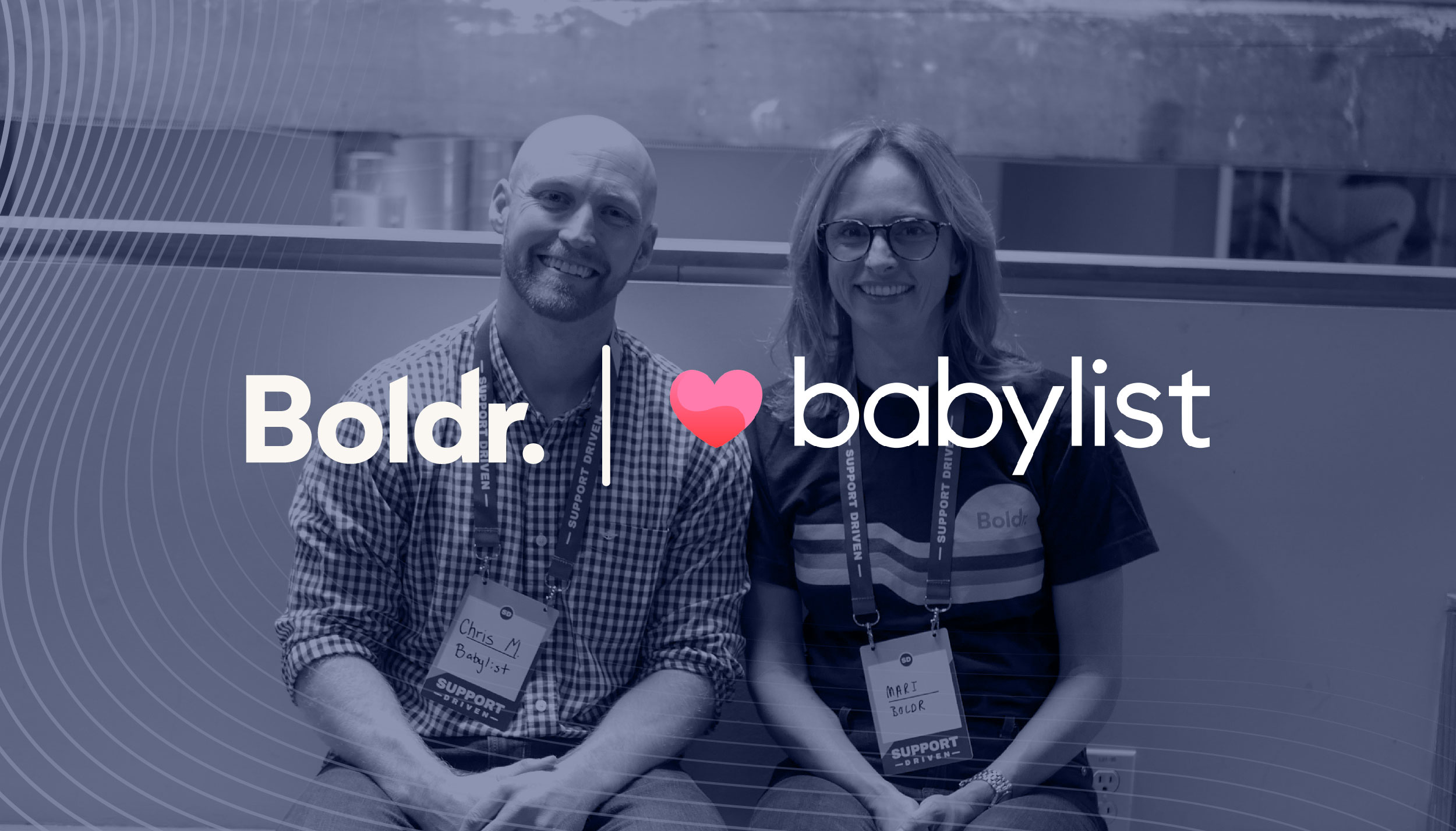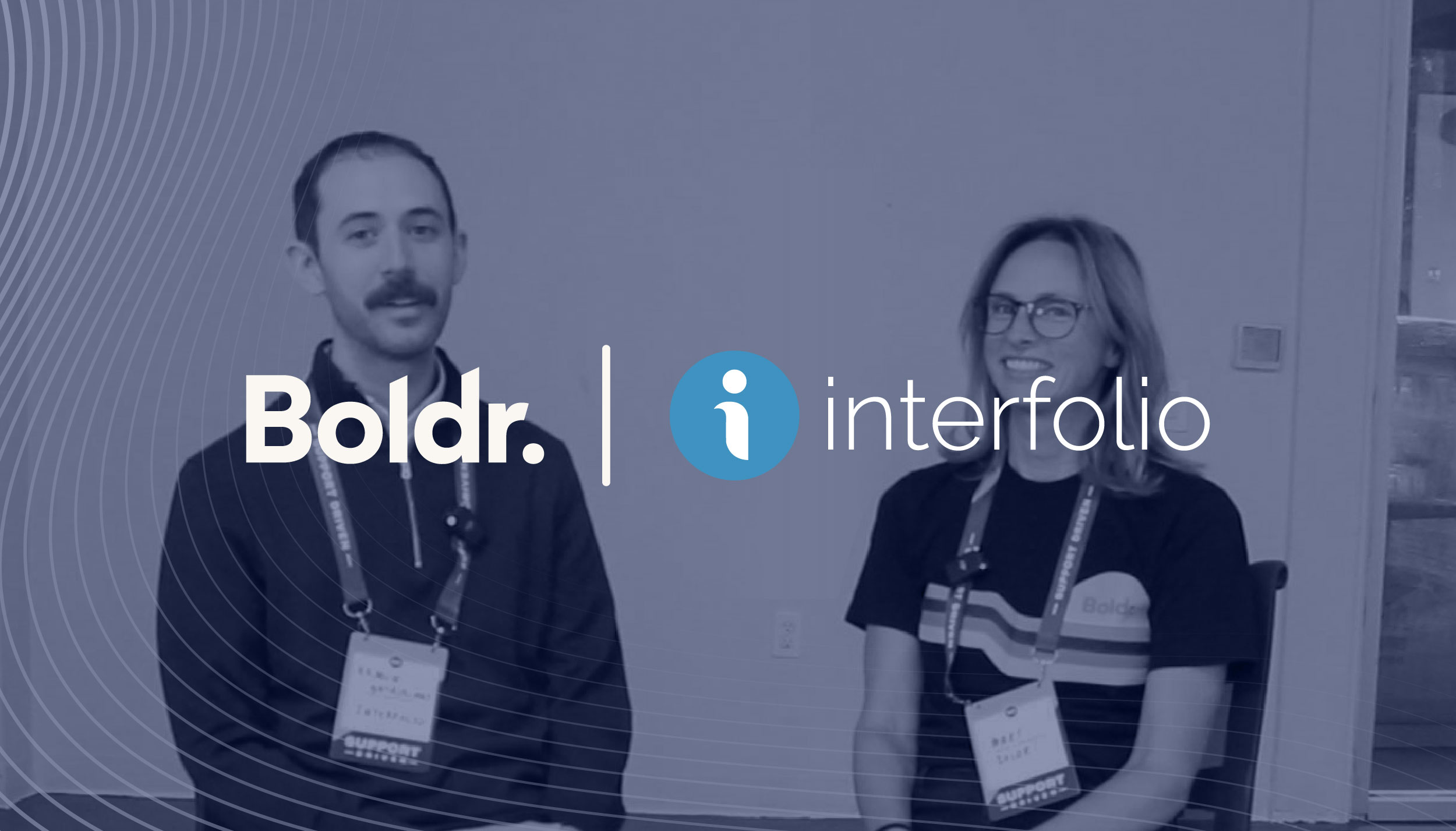Earlier this year, Neil Smith, the VP of Technical Support at Iterable, sat down with Mari Parker, the CEO of Boldr, at a Support Driven Summit. Together they discussed how the software company leveraged outsourcing to expand their support team.
The following transcript has been edited for clarity and ease of publication:
MARI: I’m Marie Parker, Chief Operating Officer for Boldr. I’m here at the Support Driven conference this wonderful Wednesday in Oakland. And I have the privilege of sitting with Neil from Iterable. Would you mind doing a quick introduction?
NEIL: My name is Neil Smith. I’m the VP of technical support at Iterable. I've been working there for nearly six years. It's been a wonderful journey. We have about 40 people on our technical support team across the globe, in the United States, United Kingdom, Australia, and now in some fun new places.
MARI: Amazing. Having a globally distributed support team must set a slightly different stage for how you think about outsourcing or engaging a partner because you already have experience working with a remote team, which is sometimes a barrier in this whole experience, especially before COVID. There was a moment when remote felt risky or uncomfortable. And you've been in that.
NEIL: It's been a gradual process. We started with a team on the West Coast of the U.S. when I started at Iterable. We knew we could expand our hours by adding someone in New York. Someone on the team wanted to move to New York. Iterable had an office there already, so it worked out quite nicely. That gave us close to 12 hours of coverage per day. Then we started thinking, how can we expand into Europe? The very first interval employee to be working in Europe was from the supporting team, so we sent someone over for six months, then we sent someone else over for another six months. By then the office was ready to go. So with people in London, New York, and San Francisco, we got to 18 hours a day. The next step, how do we get to 24?
Luckily the business had decided that it made sense for us to have a presence in Australia or New Zealand. They settled on Sydney. One of the initial hires we did in Sydney was for a support team member. That got us to that full 24-by-5. There was still a gap, though. Because you can get to the end of the day on Friday with your West Coast team and you're going to pick up Sunday evening West Coast time, the start of the day for Australia. But it leaves that 48-hour gap in the weekend. That was the problem we needed to solve. Using a partner was the path we decided to take.
MARI: I love that idea because there's only so many locations that's going to make logical sense for you to set up your own legal entity and actually run an office and so forth. Outside of global expansion plans for your business, it makes sense to look for a partner that can help you find talent in these other markets.
NEIL: This is why some shifts are difficult to hire for. I'm not going to hire the level of technical competency that I need for a complex platform like Iterable with US-based team members who want to work in the middle of the night on the weekend. That Venn diagram where those two things overlap, they just don't overlap. We needed to find a way to get talent willing to work those hours. We could have said some of our team work from Tuesday through Saturday or Wednesday through Sunday. But you can only do that when you're hiring new people. It’s difficult to ask your existing people. I've had experience working with different organizations in an outsourcing capacity. So, we started looking at what kind of models made sense for us.
MARI: How did you go about the process to find a provider?
NEIL: I needed to reframe the model I was looking for because I was hyper-focused on that 48-hour gap between the end of the day on Friday and the start of the day on Monday. There are very few partners who will provide, people who are working two days. It’s basically three shifts per day, three eight-hour shifts per day for two days. No one's going to be interested in that kind of business particularly with low volume time of the week in terms of number of tickets and being highly technical. You're not going to hire someone who wants to work 2 days a week, is really technical, and doesn't want to do many tickets.
I was thinking about a shared resource model. I’ve used that model in the past at other companies and it's worked reasonably well, as long as your volume is low and the complexity is relatively low. I talked to a few BPOs. There were a couple that might have worked for that. But then I said, what if we look at having full-time resources three of those days, they're going to be overlapping with our existing team members. That’s going to be very helpful because then a lot of people can bounce ideas and ask questions. Making that shift meant that I could go to various BPO providers and say, I'm looking for three people to cover those three shifts and it will be full-time work for them.
That was a much more interesting proposition for partners and it widen the pool of providers that I could talk to. Then to answer the question, how do they go about engaging in that process? Well, it was an RFP. A lot of leaders are used to executing RFPs. The harder question is who is in the RFP And how big an RFP are you going to have? And also what kind of questions are you going to be asking? There's no place on the web to find like, here is a BPO RFP for highly complex technical products.
I leveraged the community on Support Driven. We're here at this conference with Support Driven leaders to solicit ideas about how to put together the RFP. With that, I was able to generate a template and share that input with other leaders and organizations that I was thinking about. I had face time with some of them, Boldr being one of them. Everybody that was in the RFP was someone I had interacted with through Support Driven. I wanted recommendations from a trusted source. I didn't want to go out and work with a giant, highly well-established, faceless corporate monolith BPO. I wanted a personal experience because we were starting with just three people. It wasn't big. It wouldn't be a big deal for a really large BPO.
MARI: Talk to me about the priorities that you had set in the RFP. What are the qualities you were looking for? I hear size, obviously, that you wanted to work with somebody you know, you feel a connection with, which I think makes a lot of sense. What were the other criteria that you considered?
NEIL: Well, there's the operational criteria that is absolutely critical as to why you're doing this. I needed an organization that could provide a small number of agents. Those agents needed to be highly technical. That has greater cost when you have more technical resources. The commercials of the deal needed to make sense for us. As important as any of that was values alignment between the BPO and ourselves. Going to a large faceless monolith BPO, it will be much harder to see values alignment.
Iterable is very values-focused. We have four core values: Balance, Trust, Growth Mindset, and Humility. Aligning with those was important. A key part of the RFP was to make sure we were capturing that kind of information from the partners. Tell me about your organization, tell me about what's important to you as people, what's important to the people who work for you, and how do you look after your people?
MARI: I can assume that it's similar to interviewing a possible new team member. I feel, especially in the interview process, you move so quickly, if you had to equate it to relationships, it feels like you go on a blind date and you get married and it's pretty intense. This is even more so because you sign a contract and everything. People can put their best foot forward in a presentation. But the reality comes out when you actually work with them. So, it's been almost 90 days. We're almost through our probation period, as you would look at it for a new team member. What has your experience been like? Have you felt that Boldr has lived up to the values that were portrayed?
NEIL: I never had any doubt about the values alignment piece of it. The question for us would be, could Boldr deliver the kind of talent with the competencies that we needed. Our existing tier one team members are highly, highly skilled. They embody our values in that they are always learning. They always want to learn new stuff and they always ask each other questions. We needed the people provided by the BPO to fully integrate them and for them to be open to being fully integrated with us.
That's been our experience, which has been great. With the growth of our business, we've since added two additional people beyond the three that we started with. It's been cool to see things like, if we have a production incident and the person online is one of the Boldr team members, to see them jump up and follow our processes, figure out how to get all that engineering, share all the information that they've gathered and, work through the process. That's been great to see. That indicates that we're on the right path moving forward.
MARI: Has there been anything specific in the onboarding process that you would give to the community as advice on how to set a relationship up for success on the front end?
NEIL: It was a new experience for us working with people from the Philippines. It's a wonderful culture for working with BPOs. It's so part of what that country is. They have a clear way of how they operate. In some ways, it’s different to what we’re used to in the United States. We like to think we're very structured here in the US, but you don't have structure until you start working with a BPO that’s based in the Philippines. You have to be okay with the fact that when you have weekly meetings, those meetings are not necessarily gonna move super fast. If there’s something you don’t need to touch on that week, you won’t necessarily skip through it. The team wants to make sure they’re checking every box. It's all about us learning that piece of that culture. So, being open to how the BPO operates, is an important thing.
Allowing them to operate in the way that they feel makes them successful is something I would definitely keep in mind. There's a balance that you have to maintain around letting new team members operate independently because they will be working independently on the weekends, so we need to allow them to have that level of independence to be comfortable with the responsibility of being the person who’s online right now. At the same time, you need to manage them, direct them, give them the resources, correct them when things are going away from where you want them to. To maintain that balance between independence and direct supervision, that’s something you’ve got to feel your way through in the first three months. That needs to be a bit of both. They can't be like, you do this, this, this and this, because then they'll never learn to operate by themselves. Also you can't just leave them flailing with no support whatsoever.
MARI: Providing some level of sufficient structure so that they can self-navigate in the moments that they need to is an important and valuable thing to figure out. There are companies or clients out there who struggle with that, where they overprescribe directions, and when a team member can't navigate it on their own, there’s a frustration or the guidelines aren’t clear enough. Then there's too much room for interpretation. That can be tricky as well. Striking that balance can be tricky. Has your experience in working with us so far informed any strategy or decisions moving forward for Iterable? Like, influence the way you look at scaling a team or building a team moving forward?
NEIL: Our vision for bringing in a BPO partner was that over time you want to gradually increase the commitment with that partner, assuming that the partner was performing as we needed them to. We're still very much on that path. As an example, we started with three people and then our Premier Support team that supports our highest support tier customers. We needed to add two additional heads to that team just because the growth in that part of the business has been significant. We've always populated that team by promoting our existing tier-one team members and we wanted to do that again. That meant that we were taking two US-based tier-one team members and moving them into Premier Support. That meant we needed to backfill. It was a lot easier conversation for me to go to finance this time around and say, Hey, we’re going to do this and it's actually going to save you money. Because the two people that were moving into this new role, we need to promote them, increase the salaries, but the people that we’re backfilling with, it’s a lower cost of resource.
The one other dimension to that that I do want to call out is, it was important to us to make sure that we were working with a BPO that was providing a living wage to their team members. The cost of labor is lower in the Philippines. The cost of living is lower there too. It's okay for our BPO team members to be making less money than our American team members, as long as what they're making is fair for where they live. So, I feel okay about going to the CFO and saying, we want to do this and it can save us money because I know that the new people that we're bringing to the team through the BPO are being compensated fairly.
MARI: What I'm hearing you say is that there does not need to be a compromise between quality, commercial viability for a solution, and scalability and values alignment and doing things in an ethical way. Those can work together pretty well. In conversations, in Boldr especially, we like to lean on the ethical side of things because we're very proud of it and we get excited by it and that can be misinterpreted that that means you sacrifice somewhere else. It's absolutely not the case. I think it's table stakes that the quality has to be there. It's an assumption that there's an economic viability to the relationship and you can do it in a way that uplifts the community and the team members.
Is there any parting words of wisdom that you want to share with other support leaders out there in terms of setting up a relationship for success?
NEIL: I think it can be overwhelming and kind of scary to navigate that path from having all the internal support resources to bringing in an outsourcing partner. Many people have navigated that and come out the other side successfully. I would recommend leaders to not dismiss the idea of outsourcing because they don't know how to do it. There’s plenty of people out there who can help.
Our customers now have access to full-time online support resources, 24 hours a day, seven days a week. They didn't have that before. On weekends they had to rely on an on-call emergency phone number, which worked but wasn't the best experience. We wanted to improve the experience for our customers. If, by engaging with a BPO partner, you can improve the experience for your customers, that's what you should be doing and you shouldn't be not doing it because it's scary or you don't know how to go about it.
MARI: Prioritizing your customers. That makes a lot of sense. Thank you so much. I appreciate that. Thank you.


